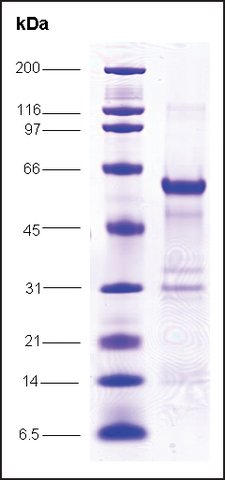您的位置:首页 > 产品中心 > C-myc, proto oncogene human
C-myc, proto oncogene human

| 产品编号: | 4085258 |
| 规格: | recombinant, expressed in E. coli, ≥80% (SDS-PAGE) |
| 包装规格: | 5 μG |
| 产品类别: | 进口试剂 |
| 品牌: | Sigma-Aldrich |
| 优惠价: | 立即咨询 |
产品别名
C-myc, proto oncogene human
MRTL
bHLHe39
c-Myc
基本信息
| NACRES | NA.26 |
| General description【一般描述】 | MYC oncogene is a global transcription factor. The gene is located on human chromosome 8q24.21. MYC oncogene is a cancer promoting gene. |
| Biochem/physiol Actions【生化/生理作用】 | The universal deregulation of c-Myc gene expression in tumor cells suggests that this oncogene represents an attractive target for cancer therapeutic purposes. The c-Myc promoter integrates diverse mitogenic signaling cascades, which are constitutively activated in tumor cells, and translates them into expression of the c-Myc transcription factor, which promotes cell proliferation, growth, differentiation, and apoptosis by regulating the expression of numerous target genes. The structural and biochemical features of the MYC family (MYC, N-MYC, and L-MYC) mark them as direct regulators of gene expression. As basic helix-loop-helix leucine zipper proteins (bHLH-ZIP), the MYCs acquire the capacity to bind the DNA sequence CACGTG (E-box) when dimerized with MAX (another bHLH-ZIP, 4,5). A head-to-tail pair of MYC-MAX dimers may, in turn, form a heterotetramer capable of bridging distant E-boxes. Among the broadly distributed positive enforcers of MYC action that are often recruited to target genes are chromatin remodeling (SWI/SNF relatives) and modifying complexes (TRAPP/GCN5 and relatives); these complexes mobilize nucleosomes and acetylate histones and/or other targets to activate gene expression. MYC binds TBP along an auxiliary pathway to control gene expression. MAD and MNT generally oppose MYC action by enlisting histone deacetylase complexes. Besides acting at the level of chromatin, MYC may also operate at later stages of the transcription cycle, after pre-initiation complex formation. In addition to using generic chromatin complexes to up- or down-regulate transcription, the MYC network also conscripts individual factors to modify expression locally on an ad hoc basis. For example, YY1, AP2, MIZ1, SP1, BRCA1, and other proteins interact directly with MYC, and so may directly modify the output of the MYC network. C-myc oncogene has high proliferative capacity. Overexpression of this gene is associated with Burkitt lymphoma. C-myc oncogene is implicated in various malignant tumors, such as, leukemia, lymphoma and human solid tumor. |
| Physical form【外形】 | Clear and colorless frozen liquid solution |
| Preparation Note【制备说明】 | Use a manual defrost freezer and avoid repeated freeze-thaw cycles. While working, please keep sample on ice. |
产品性质
| biological source【生物来源】 | human |
| recombinant【重组】 | expressed in E. coli |
| Assay【测定】 | ≥80% (SDS-PAGE) |
| form【形式】 | frozen liquid |
| mol wt【分子量】 | ~50.4 kDa |
| packaging【包装】 | pkg of 5 μg |
| storage condition【储存条件】 | avoid repeated freeze/thaw cycles |
| concentration【浓度】 | 500 μg/mL |
| color【颜色】 | clear colorless |
| NCBI accession no.【NCBI登记号】 | NM_002467 |
| UniProt accession no.【UniProt登记号】 | P01106 |
| shipped in【运输】 | dry ice |
| storage temp.【储存温度】 | −70℃ |
| Gene Information | human ... MYC(4609) |
安全信息
| Storage Class Code【储存分类代码】 | 10 - Combustible liquids |
| WGK | WGK 1 |




